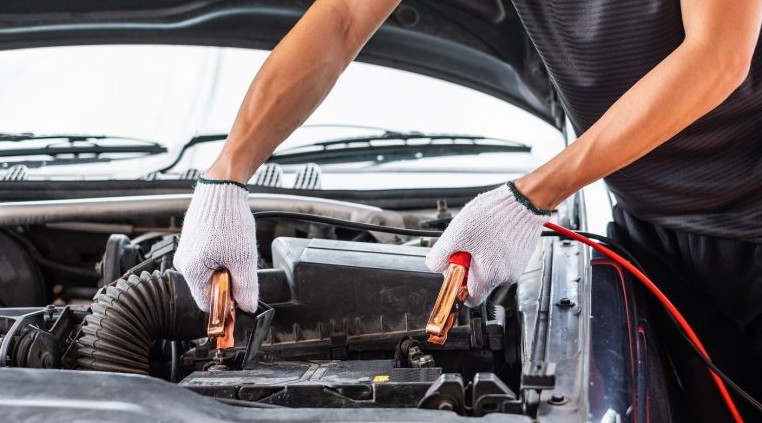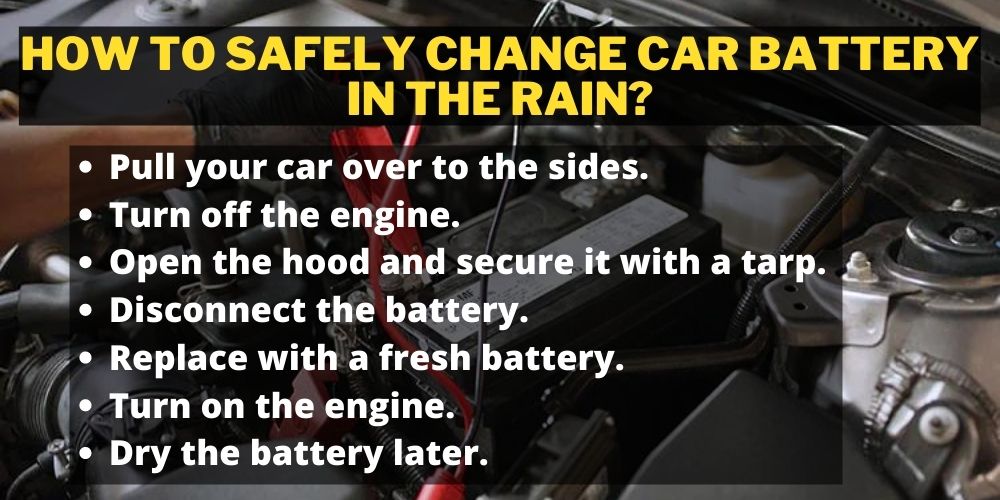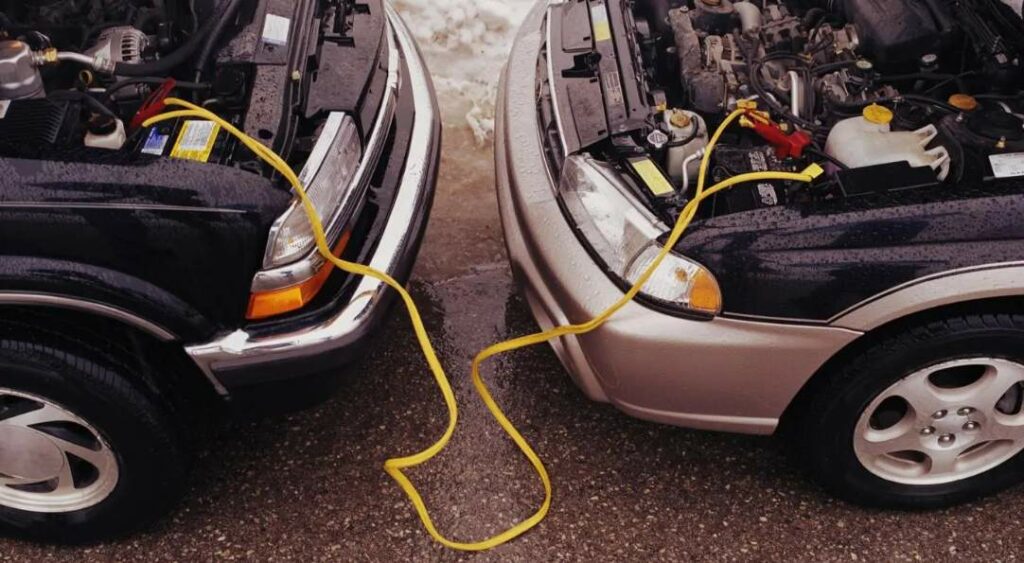You can end up in a situation where you have to change the car battery in the rain, this may sound dangerous, but it is safe to do that because of the low voltage of batteries is not sufficient to give you an electric shock.
But yes, some precautions are a must to keep in mind.

Table of Contents
Can you change a car battery in the rain?
Yes, you can change car batteries in the rain, but before doing that you should be aware of the below mentioned things.
An average car battery is charged around 12 volts which is not something that can harm you, but this does not justify the whole picture as you can’t just play with the battery even if it does not hold enough current to give you an electric shock.
You need to keep in mind a couple of things while replacing the battery- don’t touch both the terminals with wet hands as it completes the circuit. Though most automotive vehicles have a DC(Direct Current) motor, the chances of accidents are very low.
How to Safely Change Car Battery in the Rain?
If you take up necessary precautions while replacing or changing your car battery, it might not be that disastrous and won’t cause problem. The water in its pure form is non-conducting; it is only conducting when the water is diluted with some impurities such as salt.

Having said all this, now comes a question: how to safely change the car battery in the rain? Owing to this question, here are a few steps you should follow to safely change your car battery:
🚗 Step1- Pull your car over to the sides
If you suspect that you have a damaged car battery while driving, then the first that you should do is safely pull over your car over to the sides as if the car Is stalled by itself while on the running road, then there is a chance the vehicle driving behind you may hit you, which would lead to severe havoc.
🚗 Step2- Turn off the engine
Turn off the engine before opening the hood as it could be really hot because of driving or due to the damage caused by the rain or the corrosion, which would be developed around the terminals of the car, if you don’t want to burn your hand. Then consider turning off the engine.
🚗 Step3- Open the hood and secure it with a tarp
Now open the hood and wrap the engine with a tarp; a tarp is a water-resistant sheet. You can wrap this tarp to cover your engine to prevent the rainwater from corroding more on the battery terminals.
🚗 Step4- Disconnect the battery
Now disconnect the battery from the terminals as this would prevent any further damage to the engine.
🚗 Step5- Replace with a fresh battery
After removing the old or the damaged battery from the car, proceed by replacing it with a fresh or a new battery.
🚗 Step6- Turn on the engine
After installing the new battery, now turn on the engine to check if its working not.
🚗 Step7- Dry the battery later
After checking it is perfectly working, now dry up the battery later by opening Hood and giving some space for the water to dry up.
Does rain affect car battery?
The rainy season or the monsoon season can produce heavy humidity levels, which can form corrosion over the battery’s connections, making the car battery weaker. However, this may rarely affect your battery functioning, which cannot make a major impact on your car battery.
This amount of current in a car battery is insufficient to electrocute you. Still, it can corrode the battery terminals, eventually developing a rust coating on the terminals of your car battery.
If the water is kept around the terminal, it can cause the malfunctioning of the car battery. Moreover, you can experience a delay in pulling up the gas, you may have trouble starting up your car, or worse, you won’t be able to start up your car.
Can you charge the battery in the rain?
It is safe to charge a car battery in the rain as the car battery holds a voltage of 12 volts, which is insufficient to electrocute you. So here are some things you need t keep in mind while charging the car battery in the rain:
- Pull your car off the road onto the side. This would help you avoid accidents that could lead to severe damage to the car and your life.
- Open the hood carefully and cover it with a tarp to prevent any further damage to the car battery by acting as resistance against water.
- Identify the negative and positive terminals and then disconnect the battery’s terminals carefully.
- Now connect the positive and negative terminals of the car correctly to charge.
- Now start up the car and check if the car battery is working properly.
Can you jumpstart a car in the rain?
Starting a car by using the jump leads is known as the process of jumpstarting. Jumpstarting a car in the rain could be dangerous not because of the moisture or the wet engine but because of the incorrect order of the attached terminals.

Keep in mind these points to safely jumpstart a car:
- Using a tarp protects the battery from getting further wetter.
- Very carefully remove the terminals and remember the order of the terminals attached.
- After connecting the red clamps, now connect the black clamps to the negative post on another vehicle.
- Start both the vehicles and test if the car starts or not.
- Now disconnect the cables carefully.
Frequently Asked Questions (FAQs)
1. Can a car battery get wet?
2. Can you supercharge in the rain?
3. It can rain affect your car battery?
Other car battery related article you may find useful: Can A Car Radio Drain Your Battery? | When the Car Battery Keeps Dying but Alternator is Good
Conclusion
I hope I have been able to clear confusion regarding your question can you change a car battery in the rain. You can be sure it will not electrocute you if take the necessary precaution mentioned above.
